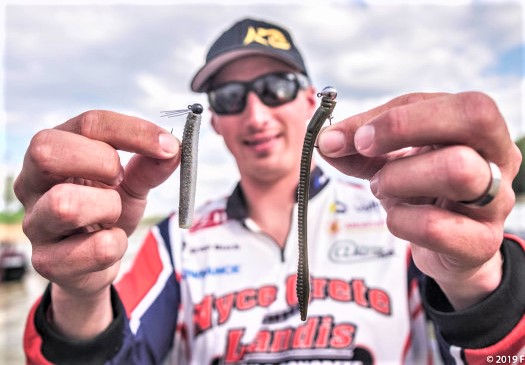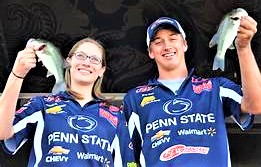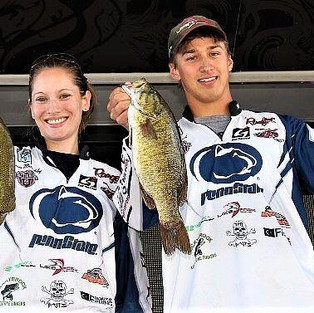LIVING THE DREAM WITH GRAE BUCK
Editor: iBass360 likes to bring you information about young anglers on the rise. Grae Buck has come up from local club events and college fishing, to the winning ranks of the FLW. Now he has qualified to fish his first Bassmaster Classic in March. Eric Evans had the opportunity to chat with Grae and discuss his story- his hopes and aspirations in the sport of bass fishing. Here are the highlights of that conversation:

iBass360: Grae, you grew up in the Philadelphia area, and so did I. Let’s face it, our area is not widely known for fishing or producing pro fishermen. How did you get interested in fishing?
Grae: My grandfather got me into fishing from a very early age. We fished all species from a family cabin in the Poconos. My parents also had a half-acre pond where I fished with my friends. As I grew up we added salmon trips and saltwater party boats to the mix.he No pun intended, but I was really hooked at a young age. I grew up in and around Perkiomenville where we also fished the Swamp and Perkiomen Creeks which had smallmouth. Any time we could get near water we had fishing rods

in our hands.
iBass360: Who were the people, that influenced, inspired and encouraged your passion?
Grae: I mentioned my grandfather, he definitely laid the foundation for my passion, but it was my friends, Jeff Nurk and his dad Harry, that really opened my eyes to what was possible in this sport. I was in 8th grade, and they took me down to fish the Flats- the Upper Chesapeake. They had a bass boat, and Harry taught me to flip tubes under docks- wow did that open my eyes. We caught some really nice fish, and the experience really broadened my thinking about fishing. From that time on, all the money I earned, cutting lawns, working landscape jobs, etc. went into my bass boat savings fund. In terms of pros, I followed Ike. Seeing a guy like me, from the Philly area, do well made the possibilities seem more real- you know, seeing a local guy do well. The other guy who helped me a lot was Justin Lucas. He served as the Emcee for the college tournaments, and was very willing to advise us and just help us adjust to the tournament scene. I also had the opportunity to be his co-angler. A really good learning experience.

iBass360: When did the competitive juices start flowing?
Grae: I have always been competitive. I played ice hockey from the time I could lace up the skates. I still play in a couple pick up leagues when the tournament and show schedules don’t interfere. I actually went to Penn State to play hockey and ended up with more success in fishing.
iBass360: So, speaking of tournaments, how did you get started in tournament fishing and how did you climb the ladder levels?
Grae: I mentioned the boat fund, getting my first boat was key. When I was 16, I had saved enough for a down payment, and my parents co-signed a loan to help me buy my first boat- a Skeeter 190 with a 150 hp motor. That boat was my baby. I started fishing bigger water and took
it down to the flats to learn more about catching under different conditions and different structure. It wasn’t long before I signed up to fish with a local club, the Peace Valley Bassmasters, in their tournaments. I kept the boat fund, but it was renamed the fishing fund. I told my parents I would pay the loan and fish using the money I would win in tournaments. It’s

great to have dreams when you are young. It definitely kept me motivated.
My sophomore year at Penn State, I started fishing tournaments with the university fishing club team. I had a boat which was more than a lot of guys. Penn State did not have an intercollegiate fishing team, but the club had enough funding to give us a travel stipend. The one rule we had in the club was that if we had any winnings, they would be put back into the club. That year, two seniors won the FLW Collegiate Event on Lake Erie and that put $10k into the club coffers. That really helped us fish a lot of tournaments at the collegiate level. During that time, I had a teammate that really supported my fishing- my then girlfriend and now wife! We finished 2nd on Lake Champlain our senior year to qualify to fish the FLW Regional on Philpott Lake in Virginia.
iBass360: So after graduating, how did you continue your competitive fishing?
Grae: I majored in aquatic biology and got a job in the Philadelphia area at Aqua Link, a nationally recognized water resources management company specializing in pond management, lake management, stream assessments, and watershed management. The salary helped build the fishing fund, and I started fishing the FLW Bass Fishing League trail in the Northeast and Mid-Atlantic. That first year I won the 1000 Islands event and I used the proceeds to upgrade my boat to the Triton 20 ft. I really needed the extra size to fish the big water. I continued that early success when, in my second year, I won the BFL Regional on the Potomac. That win came with a boat which I sold to to further supplement the fishing fund. It was about this time that I told myself I would keep moving up as long as the fishing fund held up. So, in 2016, I fished the FLW

Costa series and the B.A.S.S. Northern opens. I had enough good finishes to build the fishing fund to about $60k- the level people told me I needed to fish a season on the Pro tour. I told myself if I could do well enough to keep the fund replenished, I would just keep going, and here I am.
iBass360: What about sponsors? How did you go about securing some outside support?
Grae: I am not going to candy coat it. The whole sponsor thing is hard work. The sponsors themselves are not easy to work with and once you get past the top guys, the money falls off fast. The big companies don’t usually want to risk too much on a young guy. So then you need to turn to local companies, smaller companies, people that know you. Nyce Crete, and Landis Block

& Concrete have been very good to me. These are family-owned businesses that sell masonry tools and a vast array of stone, block and concrete products as well as other building materials. These companies have the capability to deliver their customers whatever type of masonry or landscape material they need. They have helped me a lot with boat wrapping and tournament entry fees to become my title sponsor. There is no doubt I would not be here without them.
Sometimes sponsors recognize your potential. From a business aspect, Favorite has really stepped up with me, but that type of opportunity is rare. Favorite is a new player on the fishing rod scene, and like with all products, before you commit, you need to believe in the products. What I like about Favorite is the wide range of rods. Their upper-end rods fish similar to what I used before which added to the trust. The Hex series is well balanced and achieve good casting distances. Their Phantom and Phat Glass cranking rods get lures down deep, and have the

backbone to get fish out of the weeds, so based on my experience last month on Rayburn, I am very excited about this partnership.
iBass360: Speaking about help, you have done a lot to help others, such as being part of Kurt Dove’s fishing camps. Is giving back through fishing a big part of who you are?
Grae: Definitely, and I have been trying to give something of myself to others for quite a while. As a matter of fact, it was while working at a horse farm that has a therapeutic program for differently abled kids that I met my wife. I hold Q&A sessions on-line, and face to face as time allows, with high school and college students and teams to encourage them and help them build their skills. I am planning the 1st Annual Grae Buck Fishing Clinic and Derby on Saturday July 19th, from 10 am – 12 pm at the Deep Creek Lake Boat Dock, 3036 Deep Creek Road, Green Lane, PA. Both the Clinic & Derby are free for children 16 years of age and younger. There are spaces for up to 50 children, so pre-registration is required. We will have a lot of prizes, and I am really looking forward to a fun day. To sign up, or for more information call 215-234-4528 or email greenlanepark@montcopa.org
iBass360: As you were coming up the ladder, what were some of the challenges you had to

overcome and things you had to learn to be successful?
Grae: Well as soon as I got my first boat, I had to master flipping jigs under docks. That is one of my favorite ways to fish. I also was an early adopter of throwing chatterbaits. I remember getting my first Z-mans from Dick’s Sporting Goods when they first came out. I committed to throwing it all day to gain confidence. I have gotten good at fishing the chatterbait, so good, that
Z-man became a sponsor.
The next skills I focused on were finesse fishing the ned rig, and throwing topwaters. Topwaters came pretty naturally, but I was a little resistant at first to the ned. I just couldn’t see how a bait so small could be so effective. So, I worked with it more and more over the last three years and it

was key to my wins at the St. Lawrence Northern Open and on the FLW at Cherokee Lake. When I think back on it, the hardest part of fishing the FLW Pro Circuit was that up until that point, I had not fished south of Virginia, and the giant impoundments in the South were very different from the waters I grew up fishing. What I learned was that fishing each of major southern lakes is all about developing a pattern. There is so much shoreline and so many creeks, you need to develop a pattern that works then use your maps and electronics to find water that resembles the pattern you established.
iBass360: You mentioned electronics, such a big part of the game today. Was it difficult to master
the technology?
Grae: I have been using Lowrance electronics for six or seven years. Like anything else, you have to dedicate the time to get comfortable. The side imaging has been a real game changer, and I put in the time to learn to trust what I was seeing. You have to be able to identify the type of structure you are looking for, and learn what to expect when you see certain things. This will help in finding potential spots. In the end, there is no substitute for getting experience on the water. You will make adjustments as you learn and this helps you build trust. I recommend anglers check out all the videos available. I have made some YouTube videos on using electronics, featuring techniques I have learned on different types of lakes, and there are other guys who have put their insights out there on social media.

iBass360: You’re going the 50th Anniversary Bassmaster Classic. What does it mean to you and how have you prepared for the challenge?
Grae: For me, it is like going to the Super Bowl. I spent three days down on Guntersville in late November idling around staring at structure, trying to identify areas where fish might stage for pre-spawn. I never pulled out a rod. That was a scouting trip. I also identified some transition spots. I have spent time studying Guntersville tournament results from the same time of year and I have spent time talking to people who have been successful there. We have practice the week before, but I need to understand where they will be going for the following week, not where they are the week before. I did fish a Costa event there years ago as a co-angler, and it was the site of my first FLW tournament, but the time of year was different both times. What I have going for me is that the pre-spawn is my favorite time to fish. I look forward to picking them apart with a Z-man Jack Hammer!
iBass360: So, what are your 2020 goals and how do they feed into your overall plan for tournament fishing?

Grae: First and foremost, I want to have a strong showing at the Classic. I would be content with third day appearance, but I guarantee I will be giving it all to win. For the season overall, my goal is more consistency from tourney to tourney. I want to eliminate that really bad tournament that can keep me below the cut line or keep me out of the big tournaments like the FLW Championship event. I don’t want to have to fight an uphill battle, like last year, to make the championship. Long term, successful fishing is all about good decision making. Each tournament presents challenges on the water- fish stop biting, you are in a rut. Whatever the challenge, making good on the water decisions- whether to move or not move, whether to change baits or not change and so on- these are the decisions that will make or break you in a tournament. My goal is to develop good instincts and the trust to follow them.
iBass360: There are a lot of guys that want to be where you are. What advice do you have guys fishing BFL’s and local club tournaments?
Grae: The most important thing I could tell them is to fish as many different types of water as

possible. Get as much experience with diverse the bodies of water as possible to prepare for lots of different situations. The series sites are often selected to provide a diverse experience and so to be successful you have to know different fishing situations and different types of structure. If possible, anglers should start early- high school, college, Opens, BFL’s, the BASS Nation- there is no shortage of events, so young people should get a job, save up, get a boat and get fishing- this will open up opportunities ranging from fun to professional. Don’t under estimate the experience of joining a club or fishing as a co-angler. You will fish with different guys who have different experiences. You can see how they fish, how they think, how they make decisions, and gain a wide range of experiences from which to build confidence.

iBass360: We really appreciate your time, Grae- one last question. You have had many opportunities to rub shoulders with some of the legends in our sport. Any funny stories to share?
Grae: When I first came up, I roomed with Justin Lucas, Brandon Palaniuk, and Josh Bertrand. One night we were scheduled for a dinner but we all had our boats hooked up to our trucks. My wife was the only one with an available car. We looked around and there were definitely too many people, but we were running late and there was no time to figure out a better plan. Josh and Brandon just started playing “How many people will fit into a VW” and we piled in on top of each other. It definitely showed how high energy and fun-loving these guys were. Fishermen are generally good people and a lot of fun to be around.




Comments